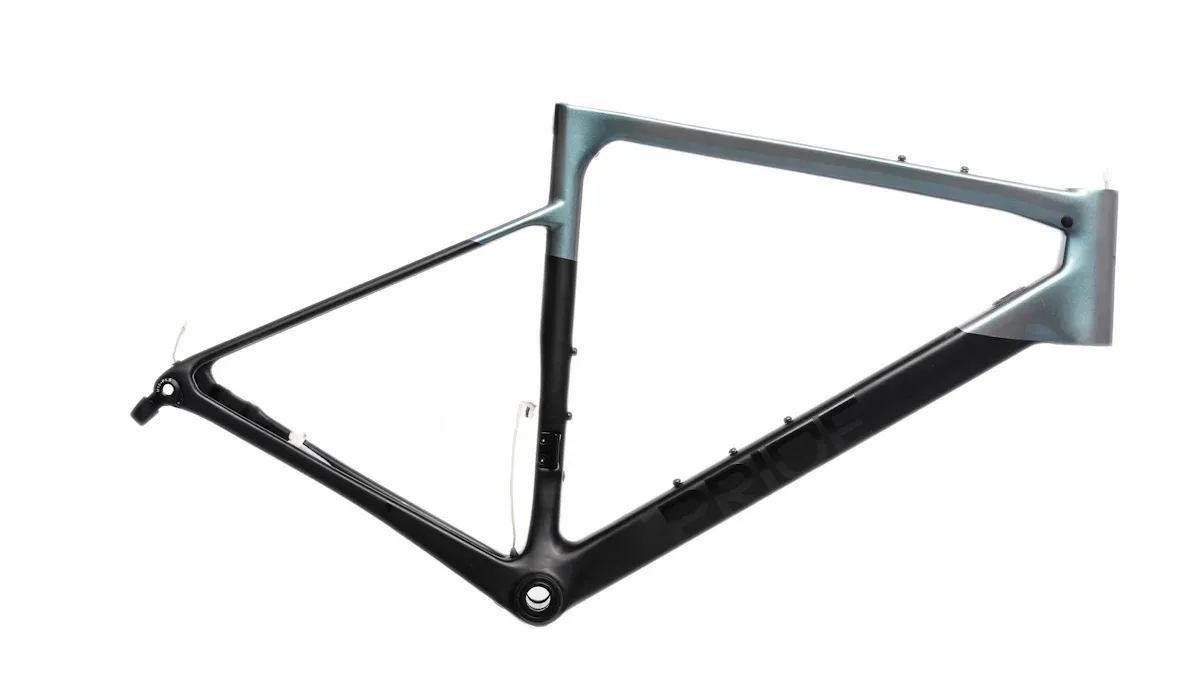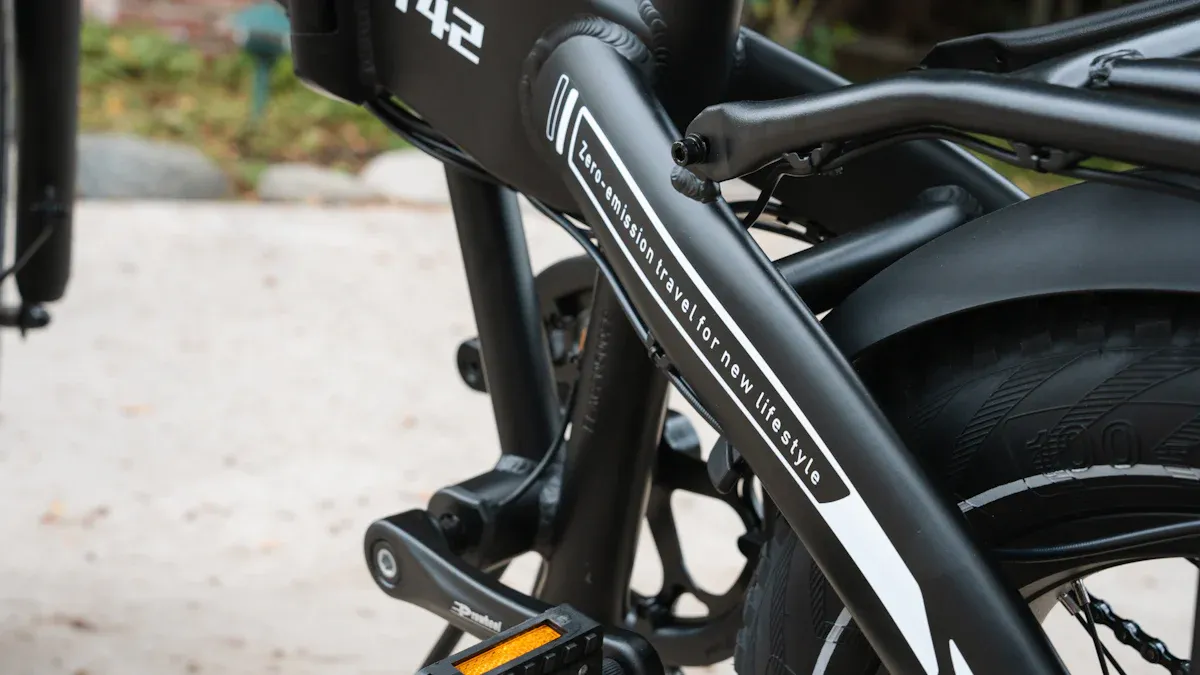
When you ride your bike, the frame material is very important. It affects how you feel during the ride. Each bike frame material, like steel or carbon fiber, changes your comfort and performance. For example, steel frames give a smooth ride on bumpy roads. Aluminum frames can feel harder and less comfortable. Knowing the good and bad sides of different bike frame metals helps you make smart choices. This way, you can find what fits your cycling style best. So, which material is right for you?
Key Takeaways
Steel frames are strong and comfortable. They are great for smooth rides on bumpy roads.
Aluminum frames are light and flexible. They are good for racing and different types of biking.
Titanium frames are strong and resist rust. They last a long time, but they cost more.
Carbon fiber frames are the lightest and most wind-friendly. They help you go faster, but they can be pricey and tough to fix.
Picking the right frame material depends on how you ride, your budget, and what feels comfortable.
Steel Frame Metals

Steel Characteristics
Steel is a common choice for bike frames. It is strong and lasts a long time. Most bike frames use two main types of steel: chromoly and high-tensile steel. Chromoly is lighter and stronger. It is shaped to cut down on weight while staying strong. High-tensile steel is also strong but heavier. Steel frames can bend a little, giving you a fun ride that many cyclists enjoy.
Pros of Steel Frames
Durability: Steel frames can last a long time, usually 10 to 20 years with regular use. They do not crack as easily as carbon frames, so they are reliable.
Comfort: Steel absorbs vibrations well. This makes your ride smoother, especially on bumpy paths. This is great for off-road biking.
Repairability: If your steel frame gets damaged, it is easy to fix. You can often repair it with simple tools, unlike some other materials that need special skills.
Cost-Effective: Steel frames usually cost less than titanium or carbon fiber. This makes them a good choice for people on a budget.
Cons of Steel Frames
Weight: Steel frames are heavier than aluminum and carbon fiber frames. They usually weigh 1-2 pounds more. This can be a problem if you want a light bike.
Stiffness: Steel has some flex, but it is not as stiff as carbon fiber. This means you might lose some power when you sprint.
Corrosion: Steel can rust if you do not take care of it. You need to check it and use protective coatings to stop rust.
Aluminum Frame Materials

Aluminum Characteristics
Aluminum is a popular choice for bike frames. It is light, making it easier to ride, especially uphill or when sprinting. Most aluminum frames use special alloys to improve their features. Here are some common aluminum alloys used for bike frames:
Aluminum Alloy 6061: This alloy is easy to weld and resists rust. It has a good mix of strength and lightness.
Aluminum Alloy 7005: This one is very strong and resists wear well. It is great for light frames.
Aluminum Alloy 6066: This alloy is strong and easy to shape. It is often used for frames.
Aluminum Alloy 6013: This alloy is stronger and easier to shape than 6061. It is becoming more popular.
Aluminum Alloy 6069: This alloy has a good mix of strength, weight, and shape ability for different riding styles.
These alloys help make a frame that is strong and fits your riding style.
Pros of Aluminum Frames
Lightweight: Aluminum frames are lighter than steel. This makes them easier to handle. This is a big plus for racing.
Durability: Aluminum frames can last longer than some steel ones. They handle stress well, so they do not break easily.
Cost-Effective: Aluminum frames usually cost less than titanium and carbon fiber. This makes them a good choice for people on a budget.
Versatility: You can find aluminum frames for many cycling styles, like racing or mountain biking. This lets you pick a frame that fits your needs.
Cons of Aluminum Frames
Ride Quality: Aluminum absorbs some bumps, but not as well as steel. You might feel more jolts on rough paths.
Fatigue Resistance: Aluminum is good at resisting wear, but it is not as strong as titanium. If you plan long rides with a lot of stress, think about this.
Repairability: Fixing an aluminum frame can be harder than fixing steel. You might need special tools or skills to repair it.
Titanium Bicycle Frame Materials
Titanium Characteristics
Titanium is a top choice for bike frames. It is very strong and light, which serious cyclists love. The most common types used for bike frames are grade 2, grade 5, and grade 9. Grade 9, also called 3AL2.5V, is popular because it is strong and easy to shape into tubes. This makes it great for making light but tough frames.
Pros of Titanium Frames
Lightweight and Strong: Titanium frames are strong but light. You get a solid frame without extra weight, which helps when climbing hills or sprinting.
Corrosion Resistance: Unlike steel, titanium does not rust. This keeps your bike in good shape, even in bad weather. You won’t need to worry about maintenance as much.
Comfortable Ride: Titanium absorbs road bumps well. This gives you a smoother ride on rough roads.
Longevity: Titanium frames last a long time. They can last for many years, making them a good investment for serious cyclists.
Cons of Titanium Frames
Cost: Titanium frames usually cost more than steel or aluminum. They can be about 130% more expensive than steel frames. For example, a titanium Salsa Fargo frameset costs around $3,149, while the steel one is only $999.
Limited Availability: Not all bike makers sell titanium frames. This can make it harder to find a bike that fits your style.
Repair Challenges: While titanium is strong, fixing it can be hard. You might need special tools or skills, making repairs tougher than with steel frames.
Carbon Fiber Bike Frame Materials
Carbon Fiber Characteristics
Many cyclists like carbon fiber because of its special features. This material is made of thin strands of carbon atoms woven together. This creates a frame that is very light but also very strong. There are different types of carbon fiber, and each type has its own traits. Here’s a quick look at the most common types of carbon fiber used for bike frames:
Type of Carbon Fiber | Characteristics | Common Applications |
|---|---|---|
High-modulus carbon fiber | Very stiff and strong, has great rigidity, and little flex | High-performance road and mountain bikes |
Intermediate-modulus carbon fiber | Good balance between stiffness and flexibility, moderate rigidity, absorbs vibrations | Endurance and all-around road bikes |
Standard-modulus carbon fiber | Good strength, fairly affordable, made from PAN fibers | Popular choice for many bike frame makers |
Pros of Carbon Fiber Frames
Lightweight: Carbon fiber frames are usually the lightest of the three materials. A carbon frame is almost always lighter than an aluminum one. This makes it easier to climb hills and sprint.
High Strength-to-Weight Ratio: Carbon fiber is stronger compared to aluminum for its weight. This means you get a strong frame without extra heaviness.
Comfort: Carbon fiber does a good job of absorbing bumps. You’ll have a smooth ride, even on rough paths, making it great for road and mountain biking.
Aerodynamics: You can change the shape and thickness of carbon fiber to reduce drag. This helps you perform better in races.
Cons of Carbon Fiber Frames
Cost: Carbon fiber frames often cost more than steel or aluminum. If you’re trying to save money, this could be a big issue.
Repairability: Fixing a carbon fiber frame can be hard. It needs special skills and techniques, which makes it more expensive to repair than steel or aluminum frames.
Failure Modes: Carbon fiber can break suddenly without warning. Unlike metals, which often show signs of wear, carbon frames might break unexpectedly, which can be dangerous.
Picking the right bike frame material is very important for your ride. Here are some things to think about:
Comfort: If you want a smooth ride, choose steel or titanium frames.
Durability: Titanium is very tough, great for hard conditions.
Budget: Steel and aluminum frames cost less, good for casual riders.
Usage Requirements: For speed and performance, carbon fiber frames are the best.
Keep in mind, “What’s best for one person isn’t best for another.” – Coach Darryl MacKenzie. Your choice should match your own cycling style and likes. Enjoy your ride! 🚴♂️
FAQ
What is the best bike frame material for beginners?
Steel or aluminum frames are good for beginners. They are strong and comfortable without costing too much. Steel gives a smooth ride, while aluminum is light and easy to use.
How do I know if my bike frame is damaged?
Look for cracks, dents, or rust. If you hear strange sounds while riding or feel less stable, have a professional check your frame.
Can I repair a carbon fiber frame?
You can fix a carbon fiber frame, but it is hard. It needs special skills and tools. If your carbon frame is damaged, ask a professional for help with repairs.
How does frame material affect my ride?
The frame material changes comfort, weight, and handling. Steel gives a smooth ride, aluminum is light and quick, titanium is strong and comfy, while carbon fiber is great for performance and speed.
Is it worth investing in a titanium frame?
If you care about cycling and want a strong, light frame, titanium is a good choice. It is very durable and comfortable, making it perfect for long rides and tough conditions.
See Also
Evaluating Aluminum Bike Frames: Strengths and Weaknesses
Understanding Bike Frame Materials: Carbon, Aluminum, and Steel
Best Materials for Electric Bike Frames and Their Benefits
Comparing Enduro Bike Frame Materials for Durability and Strength
